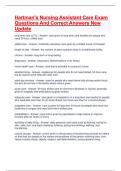Hartman's Nursing Assistant Care Exam
Questions And Correct Answers New
Update
long-term care (LTC) - Answer -care given in long-term care facilities for people who
need 24-hour, skilled care.
skilled care - Answer -medically necessary care given by a skilled nurse or therapist.
length of stay - Answer -the number of days a person stays in a healthcare facility.
chronic - Answer -long-term or long-lasting.
diagnoses - Answer -physicians' determinations of an illness.
home health care - Answer -care that is provided in a person's home.
assisted living - Answer -residences for people who do not need skilled, 24-hour care,
but do require some help with daily care.
adult day services - Answer -care for people who need some help during certain hours,
but who do not live in the facility where care is given.
acute care - Answer -24-hour skilled care for short-term illnesses or injuries; generally
given in hospitals and ambulatory surgical centers.
subacute care - Answer -care given in a hospital or in a long-term care facility for people
who need less care than for an acute illness, but more care than for a chronic illness.
outpatient care - Answer -care is given for less than 24 hours for people who have had
treatment or surgery and need short-term skilled care.
rehabilitation - Answer -care that is given by specialists to help restore or improve
function after an illness or injury.
activities of daily living - Answer -daily personal care tasks such as bathing; caring for
skin, nails, hair, and teeth; dressing; toileting; eating and drinking; walking, and
transferring.
culture change - Answer -a term given to the process of transforming services for elders
so that they are based on the values and practices of the person receiving care; core
values include choice, dignity, respect, self-determination, and purposeful living.
,person-directed care - Answer -a type of care that places the emphasis on the person
needing care and his or her individuality and capabilities.
Medicare - Answer -a federal health insurance program for people who are 65 or older,
are disabled, or are ill and cannot work.
Medicaid - Answer -a medical assistance program for people with low incomes, as well
as for people with disabilities.
charting - Answer -documenting important information and observations about residents
assistive devices - Answer -special equipment that helps a person who is ill or disabled
to perform activities of daily living; also called adaptive devices.
chain of command - Answer -the line of authority within a facility.
liability - Answer -a legal term that means someone can be held responsible for harming
someone else.
scope of practice - Answer -defines the tasks that healthcare providers are legally
allowed to do and how to do them correctly.
care plan - Answer -a plan developed for each resident to achieve certain goals; it
outlines the steps and tasks that the care team must perform.
policy - Answer -a course of action that should be taken every time a certain situation
occurs
professional - Answer -having to do with work or a job
procedure - Answer -a method, or way, of doing something.
personal - Answer -relating to life outside one's job, such as family, friends, and home
life.
professionalism - Answer -how a person behaves when he is on the job; it includes how
a person dresses, the words he uses, and the things he talks about.
ethics - Answer -the knowledge of right and wrong.
laws - Answer -rules set by the government to help people live peacefully together and
to ensure order and safety.
Omnibus Budget Reconciliation Act (OBRA) - Answer -a law passed by the federal
government that includes minimum standards for nursing assistant training, staffing
requirements, resident assessment instructions, and information on rights for residents.
, cite - Answer -in a long-term care facility, to find a problem through a survey.
Residents' Rights - Answer -numerous rights identified in the OBRA law that relate to
how residents must be treated while living in a facility; they provide an ethical code of
conduct for healthcare workers.
informed consent - Answer -the process in which a person, with the help of a doctor,
makes informed decisions about his or her health care
abuse - Answer -purposeful mistreatment that causes physical, mental, or emotional
pain or injury to someone.
neglect - Answer -the failure to provide needed care that results in physical, mental, or
emotional harm to a person.
physical abuse - Answer -any treatment, intentional or not, that causes harm to a
person's body.
psychological abuse - Answer -emotional harm caused by threatening, scaring,
humiliating, intimidating, isolating, or insulting a person, or by treating him as a child;
also includes verbal abuse.
verbal abuse - Answer -the use of spoken or written words, pictures, or gestures that
threaten, embarrass, or insult a person.
sexual abuse - Answer -the forcing of a person to perform or participate in sexual acts
against his or her will; includes unwanted touching, exposing oneself, and the sharing of
pornographic material.
financial abuse - Answer -the improper or illegal use of a person's money, possessions,
property, or other assets.
assault - Answer -a threat to harm a person, resulting in the person feeling fearful that
he or she will be harmed.
battery - Answer -the intentional touching of a person without his or her consent.
domestic violence - Answer -physical, sexual, or emotional abuse by spouses, intimate
partners, or family members.
false imprisonment - Answer -unlawful restraint that affects a person's freedom of
movement; includes both the threat of being physically restrained and actually being
physically restrained.




